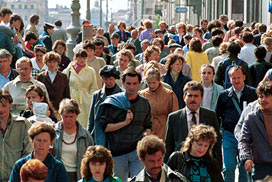What does it mean to be a Russian?
Can you tell me why we are still so keen to prove to the whole world that a Russian cucumber is thicker and longer than a French gherkin?

The Soviet Union broke up in 1991. The “brotherly peoples” e.g. Uzbeks, Turkmen, Tajiks, Kazakhs left the auspices of Mother Russia. But the neighbors in our communal apartment remained. They lived and worked in Russia for centuries: Tartars, Kalmyks, Bashkirs. We shared the bad and troubled times of the 20th century, broken dreams and desperate hopes of perestroika, shock therapy, and privatization. 
Nowadays one can hear shouts echoing through the desolate quarters: “Russia is for Russians!” Where do these shouts coming from? Do they come from some pimple-faced teens stupefied by Nazi propaganda? Are they heard in the speeches of sleazy politicians who want to capitalize on the subject?
This is only part of the problem. For the most part, a kind of national audaciousness, the reckless Russian daring seems responsible. Just a few decades or years ago our leader (be it Krushchev, Brezhnev, or Yeltsin) would normally unveil some incredible initiative or give a fright to the whole world during another state visit to the West. Anyway, it was a lot easy than feeding their own people and building democracy.
For decades the authorities have been stingy with regard to the people, the Russians being the most affected ones because they are the majority. They were underpaid, mistreated, and persecuted for nothing, sent to Gulag for speaking up against the authorities. Both within and outside the prison walls propaganda was relentlessly driving the ideas of supremacy into the hearts and minds of the Soviet citizens.
World War II veterans can recall themselves, the young soldiers from Russia, Ukraine, and the North Caucasus on the eve of the war, singing enthusiastically about the Red Army being the mightiest force in the world. Then the singing faded away, and millions of Soviet servicemen were slain in the battlefields or left to die in the prison camps. And nobody counted how many Akhmets, Haims, Ruslans, Givis were among Ivans and Sergeis buried in the massive graves.
Russian standard?
Can you tell me why we are still so keen to prove to the whole world that a Russian cucumber is thicker and longer than a French gherkin? Do we have a special “Russian standard” that makes Russians stand out in the crowd? Where is it coming from? Is it the poverty and inability to stand up for our rights in the guise of pride and bravado? Who are we to the authorities? Cheap labor, a bunch of voters who will get another round of promises and cajolery a month before another election.
We should be really proud of our “unique inimitable Russian way” only when our children are able to get good education, when we see our children become decent husbands and wives, when our soldiers stop asking passers-by for cigarettes or change, and when millions of our homeless children stop filling orphanages and reform schools. We should feel really proud of being Russian when half the Russian population stops playing hangover blues each Monday morning, and when our workers and employees learn how to unite and stand up for their rights.
“We should ask ourselves”
We will have the right to respect ourselves only when our school teachers, university professors, and doctors make more money than private security guards; when our university graduates and scientists stop begging for foreign grants. They should be confident that their skills will be duly appreciated in Russia, not in the Silicone Valley.
We will be proud of being Russian when Russian industrialists, Russian bankers and businessmen work for the benefit of our country, making it stronger and richer.
The rest of the world will hold us in honor only if we start being more demanding toward the authorities, deputies and the president, and ourselves in the first place. Foreigners will show respect not because we have an awe-inspiring missile called Satan. On the contrary, they will respect us for being citizens of a free country, not some nondescript members of another “governing party” or some subjects loyal to another czar.
Vyacheslav Kostikov
Subscribe to Pravda.Ru Telegram channel, Facebook, RSS!


